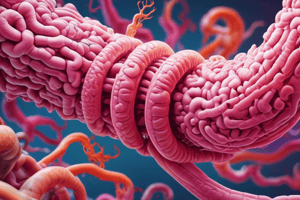Podcast
Questions and Answers
Lactate is primarily produced by species such as Bifidobacterium and Lactobacillus in the human gut.
Lactate is primarily produced by species such as Bifidobacterium and Lactobacillus in the human gut.
True (A)
Most of the lactate produced in the human gut remains as lactate and is not converted into other metabolites.
Most of the lactate produced in the human gut remains as lactate and is not converted into other metabolites.
False (B)
Butyrate, derived from lactate, serves as a primary energy source for intestinal cells and has no signaling functions.
Butyrate, derived from lactate, serves as a primary energy source for intestinal cells and has no signaling functions.
False (B)
Formate is exclusively produced by Eubacterium species in the small intestine.
Formate is exclusively produced by Eubacterium species in the small intestine.
Desulfovibrio and Methanobrevibacter are bacteria that can utilize formate in the small intestine.
Desulfovibrio and Methanobrevibacter are bacteria that can utilize formate in the small intestine.
When dietary fiber content is low, intestinal microbes primarily resort to utilizing fats or proteins.
When dietary fiber content is low, intestinal microbes primarily resort to utilizing fats or proteins.
SCFAs produced by the gut microbiota serve as signaling molecules and have no regulatory effects on biological processes.
SCFAs produced by the gut microbiota serve as signaling molecules and have no regulatory effects on biological processes.
The composition of the gut microbiome is mainly determined by geographical location rather than diet.
The composition of the gut microbiome is mainly determined by geographical location rather than diet.
The microbiome does not have any impact on the health of the host; it's only related to gut issues.
The microbiome does not have any impact on the health of the host; it's only related to gut issues.
Lactate and formate are examples of SCFAs produced in the small intestine.
Lactate and formate are examples of SCFAs produced in the small intestine.
Bacteroides and Prevotella are the most prevalent genera within the Firmicutes phylum.
Bacteroides and Prevotella are the most prevalent genera within the Firmicutes phylum.
The gut microbiome composition cannot be influenced by dietary choices.
The gut microbiome composition cannot be influenced by dietary choices.
Flashcards are hidden until you start studying
Study Notes
Small Intestine: The Microbial Metabolism and SCFA Production
The small intestine, a part of the gastrointestinal tract, plays a crucial role in the absorption of nutrients from food. However, it is also home to a diverse community of microbes that contribute to various metabolic processes, including the production of Short-Chain Fatty Acids (SCFAs) such as lactate.
Lactate Metabolism
Lactate is one of the key metabolites produced by the human gut microbiota, particularly by species such as Bifidobacterium, Eubacterium, Lactobacillus, and Streptococcus. Most of the lactate produced in the human gut is quickly converted into butyrate by other bacteria, including Eubacterium hallii and Anaerostipes. This conversion of lactate to butyrate is an important process as butyrate is a primary energy source for intestinal cells and has significant signaling functions.
Other Microbial Metabolites
Formate, another SCFA, is also present in the small intestine and is produced by various bacteria such as Bifidobacterium, Collinsella, and Dorea. Formate can be used by Desulfovibrio and Methanobrevibacter species. When the dietary fiber content is low, intestinal microbes utilize less favorable nutrient sources like dietary fats or proteins and even switch to digesting host mucus glycoproteins.
Significance of SCFAs
SCFAs produced by the gut microbiota are essential for human physiology as they serve as an energy source for intestinal cells, signaling molecules, and have regulatory effects on various biological processes. SCFAs play a crucial role in maintaining a healthy gut environment and can influence the composition and function of the microbiome.
Gut Microbiome and Health
The human gut microbiome is composed of hundreds of microbial species, predominantly from the phyla Bacteroidetes and Firmicutes. These two phyla account for the majority of the gut community irrespective of diet or geographical location. Among the Bacteroidetes phylum, Bacteroides and Prevotella are the most abundant and prevalent genera, while within Firmicutes, prevalence and abundance are highest for the Blautia, Eubacterium, Faecalibacterium, Roseburia, and Ruminococcus genera.
Gut Microbiome and Disease
The microbiome plays a significant role in maintaining the health of the host, and disruptions in the microbiome can lead to various health issues. For example, a change in the microbiome can lead to increased intestinal permeability, making the host more vulnerable to infections with pathogens.
In summary, the small intestine is an important site for microbial metabolism, particularly the production of SCFAs like lactate and formate. These metabolites play a crucial role in human physiology and are influenced by the composition of the gut microbiome. Understanding these processes can provide valuable insights into maintaining a healthy gut environment and preventing intestinal dysfunction.
Studying That Suits You
Use AI to generate personalized quizzes and flashcards to suit your learning preferences.




